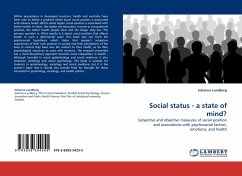
Social status - a state of mind?
Subjective and objective measures of social position and associations with psychosocial factors, emotions, and health
Versandkostenfrei!
Versandfertig in 6-10 Tagen
32,99 €
inkl. MwSt.

PAYBACK Punkte
16 °P sammeln!
Within populations in developed countries, health and mortality have been seen to follow a gradient where lower social position is associated with adverse health effects while higher social position is associated with better health. In short: the higher the education, income or occupational position, the better health people have and the longer they live. The primary question is: What exactly is it about social position that affects health in such a detrimental way? This book sets out from the psychosocial hypothesis which states that people s subjective experiences of their own position in so...
Within populations in developed countries, health and mortality have been seen to follow a gradient where lower social position is associated with adverse health effects while higher social position is associated with better health. In short: the higher the education, income or occupational position, the better health people have and the longer they live. The primary question is: What exactly is it about social position that affects health in such a detrimental way? This book sets out from the psychosocial hypothesis which states that people s subjective experiences of their own position in society and their perceptions of the level of control they have over life matters to their health, as do their psychological resources to cope with stressors. The research presented has a multi-disciplinary approach towards social inequalities in health - although founded in social epidemiology and social medicine, it also embraces sociology and social psychology. The book is suitable for students in epidemiology, sociology and social medicine, but it is the author s hope that it should also provide food for thought for those interested in psychology, sociology, and health politics.












